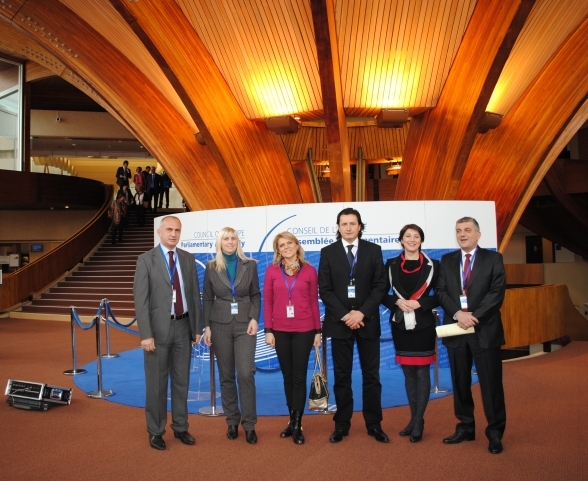The Ukrainian authorities should enter into “open, honest and effective negotiations with the opposition” and promptly seek a wide consensus on the geopolitical alignment and further democratic development, PACE said today. The parliamentarians said that the repeal of the anti-protest laws and the resignation of the government are “a first step” towards a peaceful solution of the political crisis. The Resolution calls on police and protesters to refrain from any violence or actions that are clearly aimed at provoking a violent reaction from the other side, and underlines that the excessive and disproportionate use of force by the police, and other alleged violations of human rights “need to be fully and impartially investigated, addressed and remedied and the perpetrators brought to justice”. The Assembly welcomes the initiative of the Secretary General of the Council of Europe to establish an independent advisory panel to investigate the violent incidents during the Ukrain protest, which have started on 21 November 2013. The Assembly decided not to consider the possibility of suspending the voting rights of the Ukrainian delegation at this moment. However, it could consider such sanctions at its part-Session in April “if grave human rights violations continue".
During the afternoon, at the plenary PACE meeting, the debate was focused on the following: acceleration of the action against reducing of global and regional inequalities and European contribution to the Millennium Development Goals as well as climate changes and sustainable development.
The Assembly has called on member States to step up their efforts to achieve the Millennium Development Goals (MDG) by 2015, the target date set by the United Nations at their summit in September 2000. The parliamentarians consider that, to make progress in implementing the MDGs, Europe can contribute added value by striving to reduce global and regional inequalities, setting good examples as regards good governance and the fight against corruption and guaranteeing equal opportunities and rights to women and young people. The resolution adopted today points out that, despite progress made under the MDG framework since 2000, such as access to drinking water, a decrease in mortality rates from certain diseases and an improvement in the living conditions of over 200 million people, many problems remain. According to the resolution, it is therefore essential that the Council of Europe is fully involved in this global process, until 2015 and beyond, in order to ensure that the "pan-European voice is heard worldwide".
Austrian Chancellor Werner Faymann also addressed the participants today. He said that European governments cannot allow themselves to “become accustomed” to high youth unemployment.
He said that measures already taken to save banks and to stabilise economies constituted “correct steps” but that Europe has “not done enough” to reduce unemployment. Stressing that since 2008, youth unemployment has increased in the EU by over 2 million people: from 3.5m to 5.7m, he said that it must not be allowed the young people to pay the highest price of the crisis. “We must not remain indifferent when half of young people in southern Europe cannot find work.” The Austrian chancellor warned that if nothing is done to get more young people working, Europe risks repeating the “mass unemployment, poverty and political instability” of the 1930s.
In his speech, he also condemned discrimination against LGBT population in some Council of Europe member states. But he did not support calls for boycotting “an international sporting event” because such a strategy would do more to “damage international sport” than fight discrimination.
Today, in the Council of Europe a ceremony was held in memory of the victims of Holocaust, and a ceremony to commemorate the 69th anniversary of the liberation of Auschwitz was attended by a number of parliamentarians. President of the Parliamentary Assembly of the Council of Europe Ms Anne Brasseur said that duty of all member states was to ensure that those things not to happen again, but also combating anti-Semitism and all other forms of hatred and intolerance.
In addition to plenary meeting of the Parliamentary Assembly of the Council of Europe, the following committees held meetings: Committee on Political Affairs and Democracy, Committee on Migration, Refugees and Displaced Persons, Committee on Legal Affairs and Human Rights, Committee on Social Affairs, Health and Sustainable Development, Committee on Equality and Non-Discrimination, joint meeting of the Committee on Legal Affairs and Human Rights and the Committee on Equality and Non-Discrimination, Sub-committee on Enviroment Protection and Energy, Sub-committee on Integration, Sub-committee on Co-operation with non European countries of origin and transit, where members of Montenegrin delegation participated. Additionally, meetings of Common Committee and Presidential Committee were held, where Mr Zoran Vukčević, PhD, participated as the Head of delegation and PACE Vice Present.
On the final day of the PACE Winter Session, the debate will be focused on revision of the European Convention on Transfrontier Television and responsibility of international organisation for violations of human rights.
Montenegrin delegation in the Winter Session is composed of Mr Zoran Vukčević PhD, Head of the delegation, and members of the delegation: Ms Draginja Vuksanović, PhD, Mr Mladen Bojanić, Mr Predrag Sekulić, PhD and Ms Snežana Jonica.








